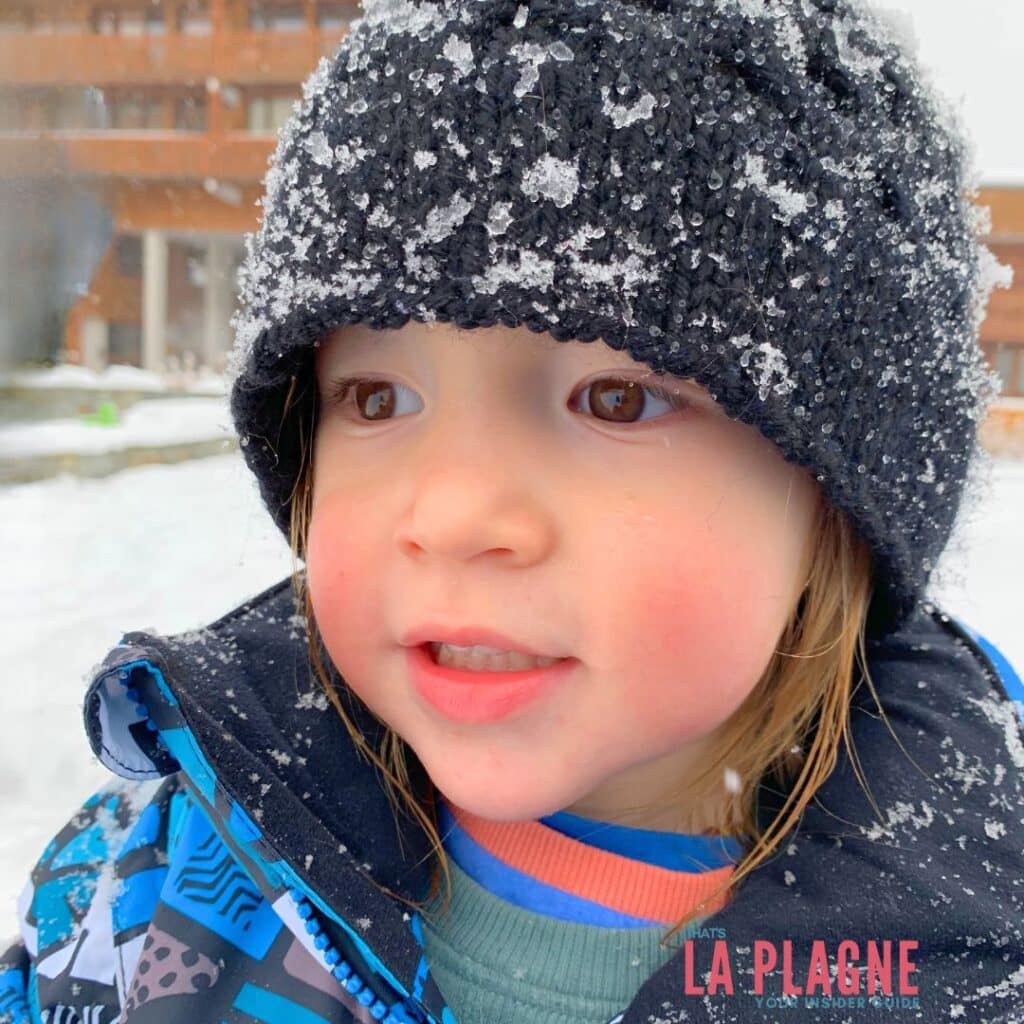That's La Plagne
Skiing for Beginners: 10 Expert Tips and Tricks: 2023
Insider secrets that YOU need to know! All about La Plagne for beginners.
Updated September 2023.
This post contains affiliate links.

Top 10 tips to make your first ski holiday awesome!
So I’ve put together a list of the things I always tell my friends before they take their first trip to the snow. It’ll help you avoid some common mistakes that first-timers make and help you have the best ski holiday imaginable.
1) When to book ski holidays
When it comes to booking ski holidays, timing is everything. If you want to save money and plan a budget ski holiday, it's best to avoid the peak season weeks, which include Christmas, New Year's, February half-term, and Easter weeks. Prices are higher during these times, but if Easter falls later in the year, the weeks can be more affordable.
Instead, consider booking your ski holiday for January or March when prices are lower, and the slopes are less crowded. You can also save money by booking ski holidays in advance or taking advantage of last-minute deals. Reading this article to learn more about what to expect during different times of the winter ski season.
2) Get some practice in
If you’re lucky enough to live near an indoor snowdome or dry slope, head there for a few taster sessions before heading out on holiday. It’ll give you a head start when you arrive, you won’t be starting from scratch, and you’ll progress off the nursery slopes faster. It’s also a great way of getting kids excited and raring to get to the mountains.
Join behind the scenes today and get the insider scoop
3) Get fit before you go
Ski and snowboard holidays are energetic and active. You’ll be doing a sport you’ve maybe never done before, using muscles you don’t usually use, and doing it for several hours a day, five or six days in a row! That’s a lot to ask of your body. So give yourself a fighting chance by getting your fitness levels up before you go. You can find my popular blog with 5 top tips for ski fitness, trust me, your body will thank you!
I also love Mobility Duo – a snow-mad couple who are 1 physio and 1 yoga teacher, specifically for snowboarders and skiers. Not only are they hilarious, but they offer free flexibility and strength advice. Plus, online yoga classes if you are looking for longer courses.

NOT ALL SKI RESORTS ARE CREATED EQUAL!
As with everything in life, not all ski resorts are created equal when it comes to beginner skiers! So choose wisely before you book a ski holiday.
4) Pick a Good Resort
Every ski resort has beginner areas, nursery slopes, and ski schools so that you can learn to ski anywhere. But some ski resorts are better for beginners than others, with more novice areas, longer green runs and better features for beginners to progress through.
La Plagne is good for beginners. It's a firm favourite, thanks to the beginner areas in each of the villages, so wherever you stay, you’ll find a nursery slope close by.
Alpe d’Huez is another popular choice because of its high concentration of green and blue runs and the designated slow zones around the mountain.
But one of the favourite beginner areas in France has to be Les Deux Alpes. This resort has a unique design that puts the beginner piste at the top of the mountain instead of tucked away at the bottom. So beginners can get a cable car up to the top – no chair or drag lifts to worry about – and learn to ski on wide flat runs at high altitudes with incredible views. Then get the cable car back down. Perfect!
5) Book ski holidays close to the snow
Accommodations that are on the ski slopes are called ski-in/ski-out. Having accommodation directly on the slopes makes life a lot easier, whether it's your first ski holiday or you're an experienced skier.
To add a little more detail, you don't just want to be on the ski soles. Look for ski holiday accommodation that is near the beginner ski lifts you will be using regularly. Also, find a ski chalet or apartment that is near the ski school meeting point. This is especially important if you are booking family ski holidays and have small children. If you can reduce the amount of walking in ski boots for your children, do it!
An extra benefit of ski-in/ski-out accommodation is that you can pop back to your accommodation easily for a toilet stop or a cheaper lunch at home instead of dining out.
It's a reason why people think La Plagne is good for beginners because the majority of ski accommodation is on the ski slopes. i.e., ski-in-ski-out accommodation. This is good for beginners, making it easier to get in and out of your accommodation in your ski boots! Find out more about how to find the best ski accommodation for your family ski holiday.
6) Book some ski lessons
One of my biggest tips is 100% do not let your partner or friends teach you how to ski or snowboard! It will lead to arguments and sore feelings!
Whilst it might seem pricey, it is worth it. Group lessons are the most common and cheaper than private lessons. However, local instructors always tell me that people tend to learn 3-times quicker in private lessons.
Even if you are an experienced skier or snowboarder, it can also be a good idea to take some refresher lessons and brush up on your technique. There is always something new to learn!
If you're heading to La Plagne, have a look at the ski school directory here to help you make an informed decision for your family.
7) Wear the right ski gear
Ski gear isn’t designed just to look cool; it performs a specific function: to keep you dry and warm and protected from the extreme conditions on the mountain. If you don’t dress appropriately, you’ll end up wet and cold and won’t enjoy your experience half so much. So, you need:
- Proper thermals, ski socks and gloves to keep your core and extremities warm.
- A couple of thin warm mid-layers that you can layer up or down depending on the temperature.
- Salopettes and a jacket made of insulating, waterproof materials.
- Goggles or sunglasses with quality lenses to protect your eyes from harmful UV rays.
- A helmet to protect your head.
- Sunscreen, the sun is powerful in the mountains, and it reflects on the snow, making sunburn a genuine concern. So protect your face!
Jen Top Tip – ‘quality’ and ‘proper’ doesn’t necessarily mean expensive. You can get decent thermals and awesome ski gear from budget or second-hand shops. It doesn’t have to be high-end. It just has to be designed for the job.
Check out my recent post on what to wear on the ski slopes.
8) Ease The Ache
No matter how much effort you put into getting fit before your ski holiday, your muscles will ache after a day on the slopes. This is because you’ll be using muscles you don’t usually use. You’ll be walking in ski boots, carrying equipment, falling over and pulling yourself back up. In short, you’ll be working hard. So make sure you look after yourself.
When you get home after a day skiing, stretch out those muscles, do a little yoga in the evenings, have a hot bath or make the most of the spa, sauna or hot tub facilities in your accommodation. And consider booking a mid-week massage to pamper those ski legs.
Jen Top Tip – check out Mobility Duo. They are a couple – a yoga teacher and physiotherapist and create snow-specific yoga and fitness plans. Plus, they are hilarious on their socials. I've joined their weekly Zoom yoga “Snoga” classes and would 100% recommend it.
9) Eat Right
Ski holidays take a lot of energy, and you need to refuel your body to keep going all week. Start your days with a hearty breakfast with plenty of protein and slow-release carbs. Opt for eggs, whole-wheat toast, porridge, granola, and fruit to start your day off right. Then hit the slopes with a few energy-rich snacks in your pockets, such as cereal bars, nuts and dried fruit.
Try to keep it light when it comes to lunch; a heavy meal will only make you sleepy and sluggish for the afternoon. So instead, stick to something light like sandwiches or soup.
Then dinner is where you can let loose. This is your opportunity to replenish all the energy you lost during the day, and Alps food is there to help you do that. Tuck into delicious protein-rich, carbohydrate-heavy meals like fondue, pierrade and tartiflette with plenty of potatoes and bread, all in the name of refuelling for tomorrow.
Check out the latest That's La Plagne News
10) Stay Hydrated
Drink water, then drink some more water and then, just to be on the safe side, drink a whole lot more water.
It’s not just the exertions of skiing that you need to counteract, but altitude too. When you arrive in the Alps, you might notice that your skin dries out and your lips get chapped. That’s the lack of moisture in the air and your body dehydrating several times faster than it would at sea level. So drink plenty of water throughout the day, and carry a reusable water bottle or Camel Bak while skiing.
Keeping your skin hydrated and glowing is also a challenge on a winter ski holiday, so check out 10 winter skincare essentials to keep you Instagram-ready on and off the ski slopes!
Check out the latest That's La Plagne Bars & Après Reviews
BONUS TIP! Après Ski Early, Then Head to Bed
Speaking of drinking, one of the best things about a ski holiday is the apres-ski culture. Technically apres-ski is anything you do after skiing, so it could be outdoor activities, dinner, board games, or shopping. Still, when you hear the term thrown around, it generally means drinking alcohol. Specifically, drinking after skiing and before dinner. So roughly 4 pm till 8 pm, that’s the apres-ski sweet spot. That’s when you’ll find live bands playing in bars, people dancing in the snow in their ski boots or on tables in their socks, throwing back vin chaud, jaeger bombs and shots of toffee vodka with abandon. It’s just great fun.
One of my most important top tips to make your ski holiday awesome is to leave after the apres! If you leave the bar at 8 or 9 pm, you can grab a pizza and be home, rehydrating and tucked up in bed by 11 pm. Get a full night’s sleep, and be up, fresh and ready to start another day on the slopes.
However – if you don’t leave at the end of the apres session, if you stay in the bar for the late-night frivolities, if you continue drinking and stumble home at 2 am, that next day on the slopes is not going to go nearly as well. You have been warned.







One Response